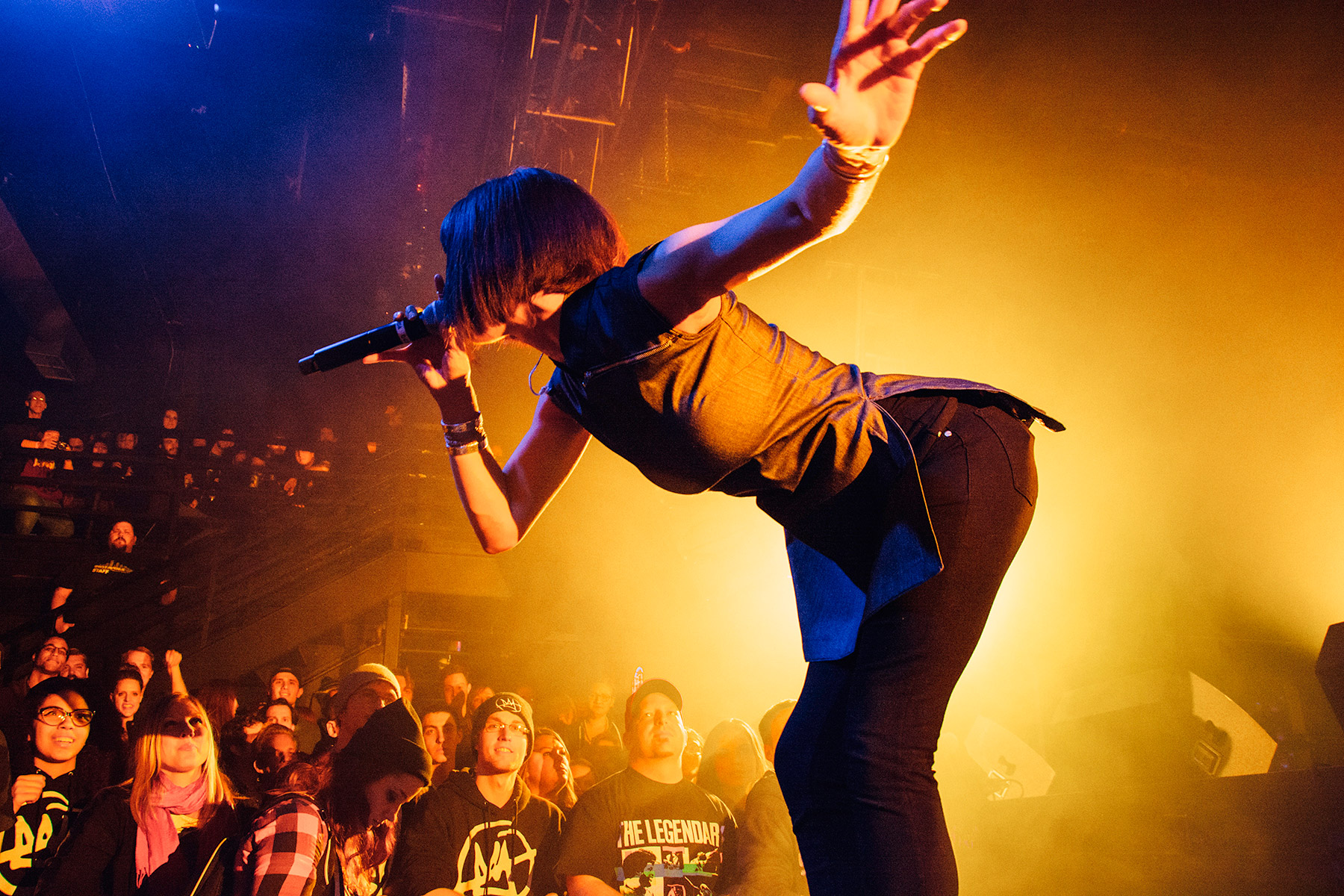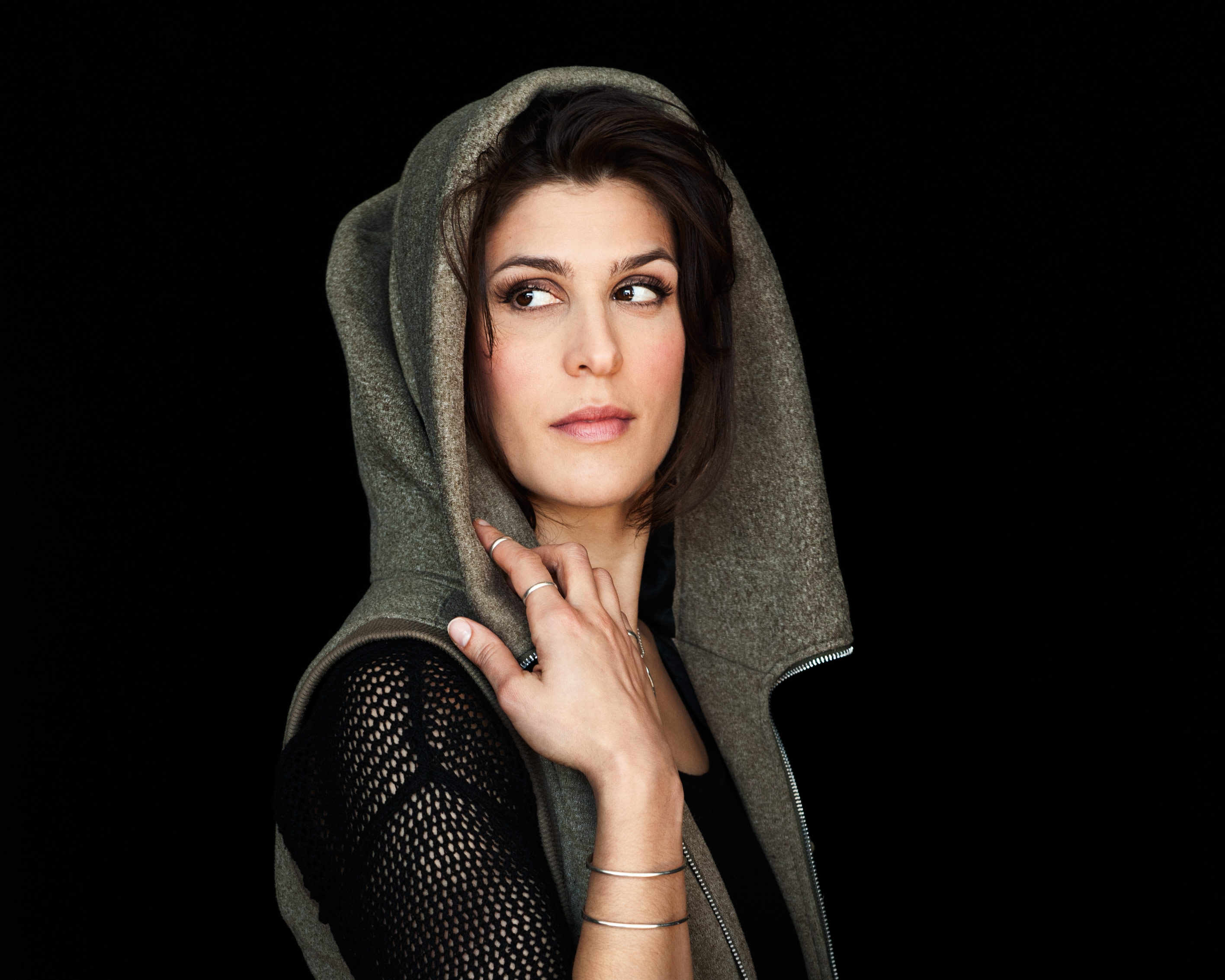
- Interview by Tammi Heneveld October 13, 2015
- Photo by Kelly Loverud
Dessa
- musician
- writer
Dessa is a rapper and writer based in Minneapolis, and a member of the indie hip-hop collective and record label, Doomtree. She has released two EPs and three albums as a solo artist, and has published two books of poetry and creative nonfiction. Her latest album with Doomtree, All Hands, was released in January 2015.
Describe your path to what you’re doing now. My path to becoming a professional rapper has been pretty circuitous. I’ve liked language since I was a little kid. I remember riding on the bus when I was in elementary school and picking out objects I saw through the window and trying to cobble together convincing dictionary definitions for them. For example, a hydrant might be: “Hydrant—noun: municipal faucet on corners to be used in case of emergency by authorized persons.” My love of language later led me to essays, then to spoken word poetry, and eventually to rap.
Was creativity part of your childhood? Yeah, but when you say creativity, I initially picture Mrs. Doubtfire and hand puppets and glitter paint and kids shouting, “I’m a dinosaur!” (laughing) My family was creative, but there was something more formal about it. For example, my dad is a linguistically playful guy and has a curious intellect, but he isn’t a big fan of baby talk—he talks to children like they’re little adults. My mom studied Elizabethan stage craft, and I recall reading Othello with her and then acting it out in my room with friends. My mom is originally from New York, but she has a weird, Laura Ingalls Wilder-type of fascination with the pioneer era. We did things like sew quilts, pretend to live in a sod house, and dye fabric in the backyard. I think my mom loved to imagine being involved in the settlement of the west, like, “Let’s pretend we’re starving!” (laughing) I had a bonnet and everything.
Did your family have an interest in music? Yeah, my dad actually made his living as a lute player during his twenties. When he practiced the guitar or lute, I wasn’t able to name all of the chordal structures, but I knew that many of them were melancholy and sad. They didn’t sound like the dancy, sugary progressions that I heard on the radio, and those kinds of sounds found their way into my music. I think the fact that both of my parents were incredibly verbal definitely informed the way I grew up talking, writing, and thinking about the world.
After high school, I studied philosophy and creative writing at the University of Minnesota. I did an International Baccalaureate diploma program and graduated at 20. As I neared the end of school, I didn’t feel called to earn my master’s degree in philosophy because I didn’t see an obvious career path in that field. I knew I wanted to do something in the creative arts, but I wasn’t sure what that career might look like. In order to make money, I waited tables and worked as a medical technical writer, creating the manuals that doctors use to implant pacemakers and defibrillators into patients. It’s a cool and intense and sort of stressful gig.
In 2001, I got involved in the slam poetry circuit somewhat by chance. I was going through a lousy breakup and my roommate, Jaclyn, walked into my bedroom and said, “Get some clothes on. You need to get out of the house.” She brought me to a poetry slam competition and at the end of the evening she turned to me and said, “I think you could do this.“ At the next competition, I read a poem I had written and I won. I thought I was hot shit until I learned that all of the good poets had been away on tour that night, meaning the competition was significantly thinned. Regardless, whoever won that evening was obligated to compete on behalf of the Minnesota Spoken Word Association for the next calendar year, so I had unwittingly involved myself in that scene.
During those years, the spoken word and hip-hop communities had a lot of overlap, so it was through the poetry circuit that I ended up meeting my labelmates from Doomtree Records. One day, another poet asked me if I wanted to try rapping. I was hesitant at first, so he gave me a big stack of underground rap CDs. The album I liked the most was homemade-looking, with a screen print of a dead bird on the disc. Maybe it was the amateur nature of the recording, but the rappers sounded urgent and authentic—they laughed real laughs, and in moments of anger, they sounded legitimately angry. It sounded like a recording of a special performance, not just something perfected in a studio. I was drawn to that. I asked the guy who gave me the CD where it was from, and he said, “That’s Doomtree—they’re the guys who live next door.”
I met Doomtree shortly thereafter and became totally taken with the whole group. I didn’t want to insinuate myself inside—it would have seemed really presumptuous to tail a rap crew with the hopes of being asked in. Of course, in my heart of hearts, that was exactly what I had hoped would happen. And it did. That was about 10 years ago. Since then, Doomtree has evolved from being a group of friends who make music in a collective, grungy basement to a group of friends who make music in our very own finished basements. (laughing)
“There are constantly opportunities to do something that I’m not good at…it’s like that in every field: if you do something for long enough, you become good at it, and eventually you’re promoted to something new that you’ve never done before.”
Was there an “Aha!” moment when you realized that music was something you wanted to pursue? It was more a series of small, encouraging moments rather than one, definitive epiphany.
When I was younger, I was more focused on writing. For a long time, I didn’t think I was a good singer because my mom had an incredible voice. She could sing along with divas like Whitney Houston—not effortlessly, but she didn’t have to bring any notes up or down. I could’t sing along to those songs as easily because the ranges are too wide. I thought that if I couldn’t sing as well as my own mom, then becoming a professional singer didn’t seem viable. It was only when I reached my twenties that I realized my mom had the skill to sing professionally—she just chose a different path.
One of the biggest moments was when I was asked to join Doomtree. I admired them so much, and it meant a lot to me. When I recorded my first song with them, it was with a member of the crew who is a stoic. He made a point of not being easily impressed—which we all do when we’re 21—but when we finished recording, he told me, “That’s really good.” I wanted to frame that moment in my mind. We recorded super late at night, too: I remember being so tired that while I was waiting to sing a harmony, I fell asleep and woke up to the sound of my Bud Light hitting the ground. (laughing)
Flashing forward a few years later, when I was on my first national tour, I heard a really good review of my first record, A Badly Broken Code, on the radio. All of a sudden, people started texting and calling me, and my phone wouldn’t stop chiming. That was the moment when I thought, “Wow, I might not have to pick up any more shifts at the restaurant.”
Have you had any mentors along the way? First and foremost, the dudes in Doomtree have been the biggest mentors to me. They have shaped the way that this life works for me and for one another.
Someone else who had a big impact on me is a business mentor named Tony Signorelli. Right after I graduated college, I was looking for a gig where I could earn good money working a small amount of hours so that I’d have a lot of free time to make art. The only people I knew of who could do that were really good servers and strippers, but my dad suggested I try technical writing. It’s one of those freelancing jobs without health insurance or steady work, but the hourly pay was good. When I decided to do it, Tony Signorelli was the guy who hired me.
Tony is an incredible teacher when it comes to business and developing systems of accountability and collaboration, and we did a broad range of work. For example, some of what we did was writing for medical and diesel truck companies. Other times, his firm would be hired to go in and document the way a business was working and then go back in and try to streamline it. We might say something like, “Hey, did you know that two people in department x are filing the same form? Maybe just one of them could file the form,” or, “This form goes through this person’s desk three times, but what if we put that person at the end of the process so it only went through once?” We were looking for redundancies and were creating opportunities to make systems better.
That way of thinking lined up with a lot of the kind of thinking that I did in philosophy, and I took a lot of Tony’s lessons back with me to Doomtree—though the Doomtree guys had ample opportunity to roll their eyes at me whenever I tried to use business jargon in our meetings. I’d say stuff like, “What are our action items for today?” But everyone in the meeting—including me—would be drunk. (laughing)
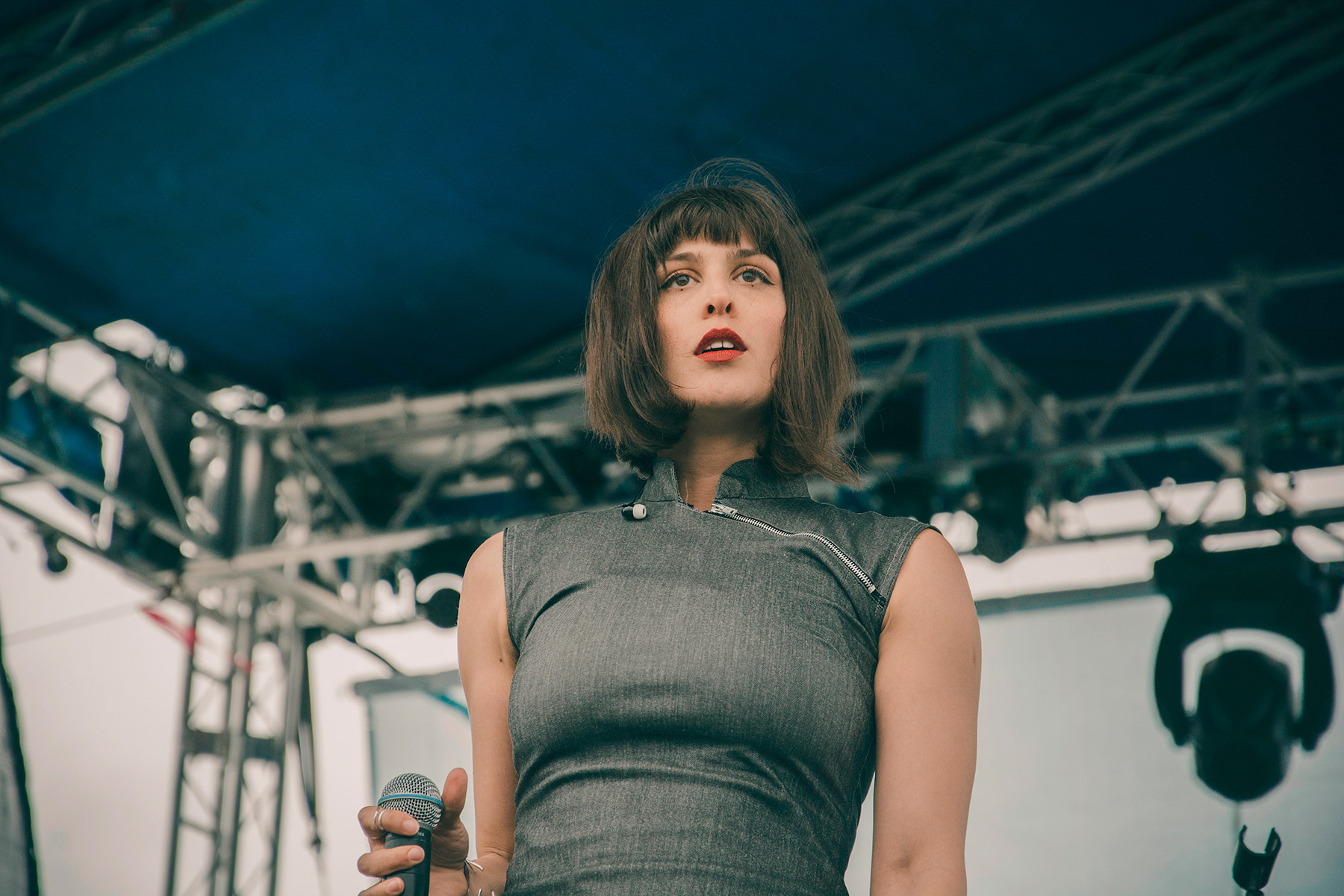
“Everybody in Doomtree wants everybody else to have the opportunity to aesthetically investigate what is most interesting to them. Art comes first.”
You’re the CEO of Doomtree, right? I am, but I recently talked to Lazerbeak about updating our structure because I think I’m more of a vice president now. I tour a lot, so Lazerbeak does the lion’s share of operations. He and I usually only confer on big, strategic stuff, particularly when there’s a record coming out or a big show coming up. I help out with a lot of the public relations and strategic marketing campaigns. I’m only listed as the CEO because we had to write something on the small business application.
However, I don’t think the way Doomtree operates would be a representative sampling of how the rest of the music industry works. I think a lot of other music professionals would say things like, “But what about contracts?” We’ve built an organization that works specifically for the seven of us, but people generally try to build businesses where the personnel can change because the internal systems support it. Instead, we thought, “What would work for only these seven people?” We make up a lot of systems as we go as new needs arise, and there’s a lot of voting.
Was there a point when you decided to take a big risk to move forward? Yeah. In 2010, I was really tweaked out about releasing my first album, A Badly Broken Code. That was in part because I received a disproportionate amount of great feedback from people when I released my first EP, False Hopes, in 2005. After that, I felt like the only place I could go was down. Everybody liked that little EP so much, and I was scared that I would disappoint everybody with a proper, full-length effort. Releasing records is definitional to being a musician, but I felt a lot of angst about putting it out.
Doing shows where I feel the most out of my element are often big risks. My first appearance at a stadium was pretty nerve-wracking. I was doing a one and a half song feature, but I had never been in an environment like that before. At one point, there was a giant wall that was set to descend over the stage, and I was warned three times that if I went out into the middle of the field, then I had to get back under the wall. It ended up being a terrifying moment, like in a horror movie when you have to drop-slide to make it under a garage door before it closes on you. It was scary.
There are constantly opportunities to do something that I’m not good at, and I often sign on to those projects because I’m trying to reach a wider audience. But I think it’s like that in every field: if you do something for long enough, you become good at it, and eventually you’re promoted to something new that you’ve never done before. Then you think, “Shit, the stakes are higher now!” (laughing) I’d say I get to hyperventilate over a new opportunity about five times a year, and it usually has to do with a performance that’s new or larger than ones I’ve done before.
Did joining Doomtree alleviate some of the risk you felt about pursuing music professionally? Yes, and in part because I felt like I found a culture that I could work well within. If it was just me in a small boat out in the world, I’d be dealing with a lot of the prevailing music culture, which I don’t like—it’s inordinately preoccupied with appearance and fashion, in my opinion, and it’s kind of douchey. Luckily, I found people who I really like and who had a boat I could climb into. Everybody in Doomtree wants everybody else to have the opportunity to aesthetically investigate what is most interesting to them. Art comes first.
“The actual act of creating is all about not getting it right until the second you do, and then the creative process is over.”
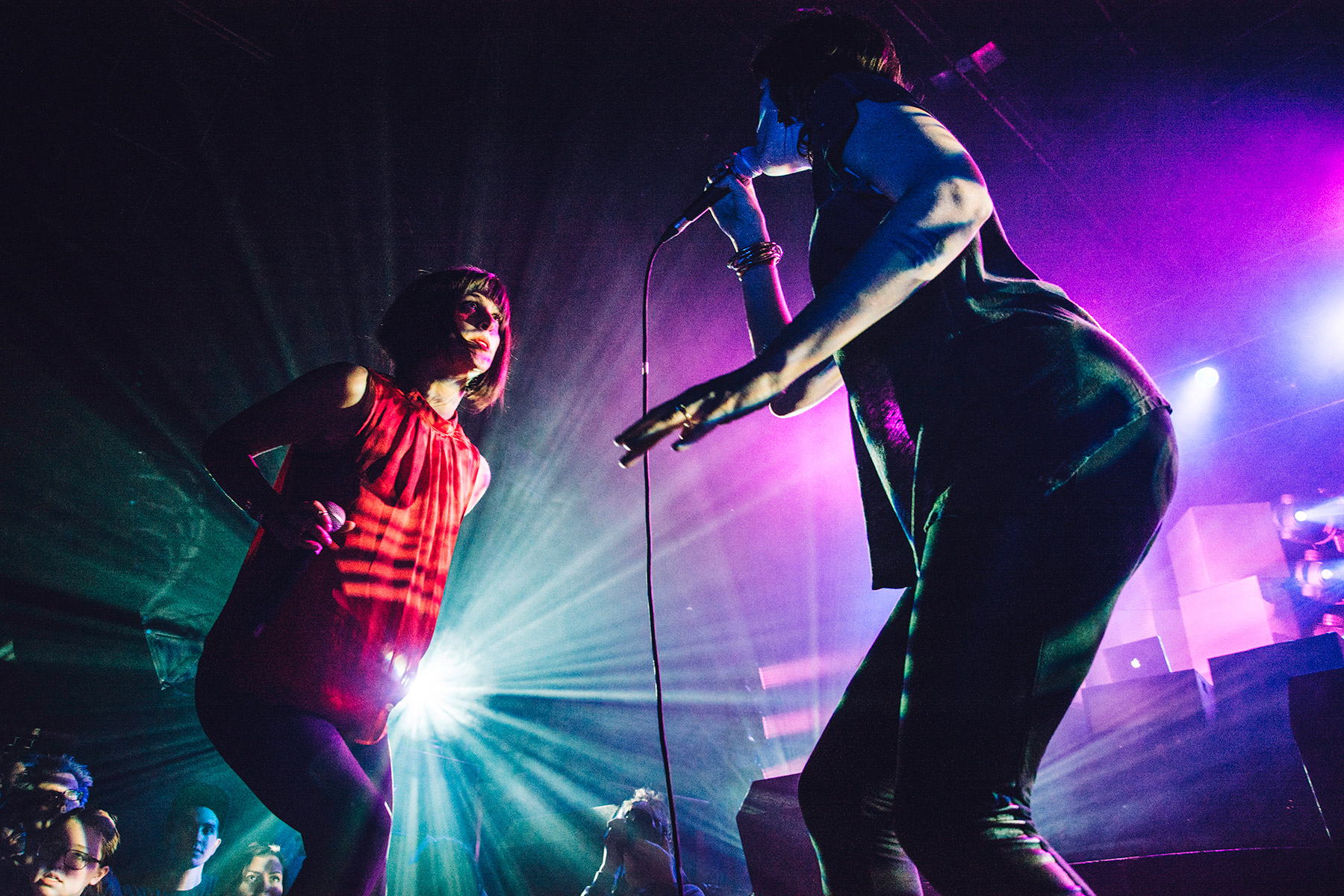
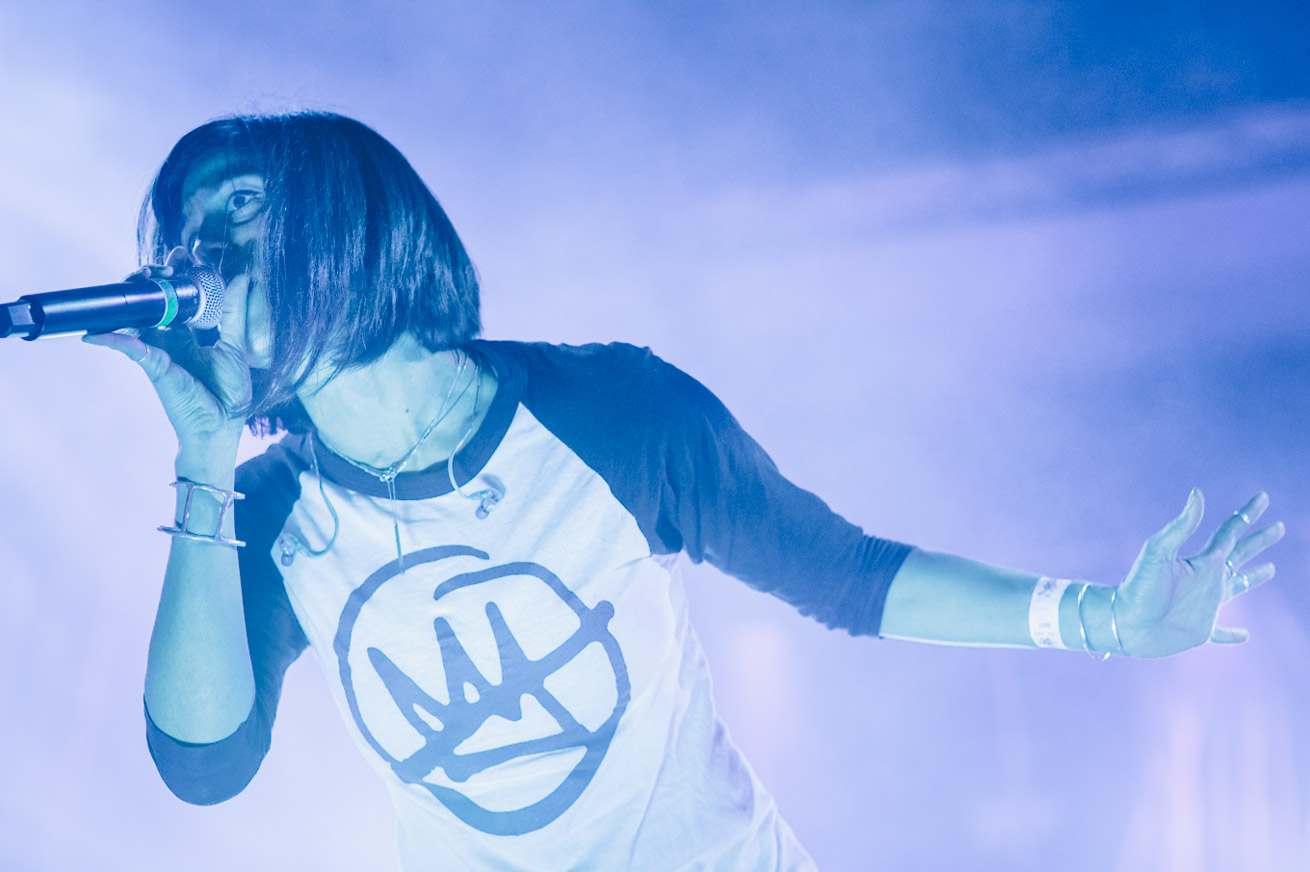
Are your family and friends supportive of what you do? Yeah, but it took a while. I had to call my mom and say, “Thanks for helping me pay for college, but I’m in a thing called Doomtree now!” (laughing) It took a few years, but I remember making my dad a mixtape of rap music and trying to explain what else it was besides what he sees on TV. Those first few years, as far as the business and income side of it goes, were a pretty slow build. I probably didn’t reassure them too much because I was still figuring it all out. But in the past three or four years, I’ve been able to remind them that I’m okay—I don’t need a Christmas check anymore.
What was the progression from starting out in Doomtree to being able to support yourself with music like? In the early days of Doomtree, we burned our own CDs, made copies of the album art on a photocopier, and slid everything into empty jewel cases. Everybody used their own computer, or a family computer, until the day we found somebody who let us borrow a 10-CD burner, which decreased our production time from about 4 days to 10 hours. Once we reached a point where we thought we could move 1,000 CDs, we took a master recording to a company to duplicate them professionally.
For shows, our growth was informed and directed by organic demand. When we could draw 30 people, we played at tiny venues; then when we could draw 500 people, we started moving up to mid-level venues, which is still where we are in a lot of cities around the country. Here in Minneapolis, where most of us live, we can usually play larger venues for 1,500 or 3,000 people.
Are you currently touring? Yeah, we’re touring for our most recent record that came out in January, All Hands. We’ve cut the tour up into a couple of legs, which is nice. We’re currently touring the West Coast.
Do you feel a responsibility to contribute to something bigger than yourself? Yes, neurotically. The fear of death is the subtext there. (laughing)
Are you creatively satisfied? For brief moments. It feels awesome to finish something that I think is good, but it’s tough sledding to get there. I don’t feel relaxed or happy when I’m sitting in front of a computer screen writing an essay or in front of the piano figuring out a bridge. I mostly feel frustrated that I don’t know what I’m supposed to do to make it awesome. The moment I figure it out, I experience a great afterglow for a few hours, but then it’s over. I’m extremely proud of the good work I’ve completed, but the actual creative process is kind of a slog for me. The actual act of creating is all about not getting it right until the second you do, and then the creative process is over. Afterwards, it’s like, “Tight. Time for dinner.”
What advice would you give to a young person starting out? I’m a little wary when I’m asked to give advice because I know that there are so many different ways to get there. That said, if I were to give advice, it would probably be similar to some of what I said in the commencement speech I gave at my alma mater a few years ago: learning to live inexpensively is good form for a creative because money is going to be tight in the first few years. As human beings, we should be careful about how romanced we are by advertising. I know I sound like my mom in her sod house right now, (laughing) but paying attention to how much you let into your head and being skeptical of the culture in which you live is important, and part of that skepticism would sometimes entail frugality. You don’t need the name brand shit. Once you’re making money, it’s fine to re-evaluate your spending decisions; but in those first few years when money is going to be scarce, you will buy yourself hours of creating if you can forego the nice car or the latest shoes and live a little under the radar.
How does living in Minneapolis influence your creativity or the work that you do? It’s a little tough to say, because I haven’t lived anywhere else. Minneapolis is my control group and my experimental group, so I’m not sure how it would change if I lived elsewhere. Minneapolis has provided me with a great foundation—they really care about the arts here. For example, people generally vote yes during local elections to devote some tax money to supporting the arts. When people go out on dates or out with friends, they usually see a local band. That isn’t the case in every city, but in Minneapolis it’s baked into the culture. There’s an amazing number of good local bands here, and more hip-hop than you would think. Rhymesayers is based here, and they have artists like Brother Ali and Atmosphere showing the hip-hop community that an artist-owned and -operated indie label can put somebody in the top 10 Billboard charts.
I have been thinking about spending some of my time in New York, and this year I actually started renting out Airbnb’s there between tours. After traveling over the past 10 years, I have to say that I do like some of the onslaught of sensation that happens when I’m in places like New York. When I’m stuck on a song or a story there, I can walk around and see a three-legged dog or a pregnant woman smoking a cigar or something that might jolt me out of my writer’s block and put me back on the page.
“Once you’re making money, it’s fine to re-evaluate your spending decisions; but in those first few years when money is going to be scarce, you will buy yourself hours of creating if you can forego the nice car or the latest shoes and live a little under the radar.”
It sounds like it’s important to you to be part of a creative community. Like I mentioned earlier, I’m not in love with a lot of the prevailing cultural values of the mainstream music industry, so having people who also aren’t in love with that world helps me get work done outside of it. I’m lucky to have access to all the producers in Doomtree: Paper Tiger, Lazerbeak, and Cecil Otter make some of the most amazing compositions, and I’m lucky to be a friend and collaborator of theirs.
What projects are you interested in pursuing in the next three to five years that you’re not already doing? I’ll start with shit that seems real and then move on to stuff that is speculative.
First, I really want my new collection of stories and essays to work. I haven’t wanted something this bad in a very long time. Sometimes it’s easy to be dismissed as a musician who writes, because a lot of people think, “Oh, a little book of lyrics! That’s so cute—Jewel put out a book, too!” (laughing) But I’m writing in the hopes of being a serious literary contributor. I have no interest in trying to coast on any small reputation that I’ve built as a musician—I’m taking my licks and getting rejected from publishers and all of the other literary entities.
Recently, I have also been banging away at the Yamaha keyboard in my living room, working on a collection of love songs that aren’t rap. I’m a little scared to move in that direction because I know a lot of people like the idea of me as the female rapper in Doomtree, but I have a lot of interest in creating music as a pianist-singer-songwriter. Some people might press play in their cars and be like, “Whaaat?” I think I’d be considered cooler if I came out saying something like, “Here’s some crazy new shit where I’m rapping in Spanish over industrial beats, and it’s hard as hell!” That way, even if people didn’t enjoy it, they’d still say, “Oh my god, that’s so tough!” But instead I’m like, “Do you guys remember Sarah McLachlan? I’m doing that shit now!” (laughing)
But that’s how you grow as an artist: by pushing yourself to try something new. Exactly. The other day I thought, “Fuck it. So what?” Why am I trying to appease imaginary people smoking weed in their imaginary cars? I just need to put it out. It’ll either land with people or it won’t, but I want to be brave enough to release those songs in an unapologetic way.
Apart from that, I’m also talking with a conductor about writing some new works for an orchestral collaboration and an ensemble choir. I’ve done a little bit of that in the past, but I don’t read music, so I’d like to partner with a composer who can help me capture my raw ideas and figure out how to make them better.
And now to move into total bullshit: I want to act!
It’s not bullshit—it’s your dream! Alright, I meant dream! (laughing) Yeah, I want to do something with film. I don’t want to do toothpaste ads or anything, but I would love the opportunity to write a short screenplay and try to pull it off with some of the video talent here in Minneapolis, which is surprisingly awesome. There are so many amazing filmmakers here.
What does a typical day look like for you? I have on-tour days and off-tour days, and they’re both pretty different. On tour, I wake up in a shared hotel bed and hit the road around 10am. Around 6pm, we arrive wherever we’re going to do a sound check, and doors open at 8pm. We go on at 11:30pm, play for an hour and a half, and then sell and sign merch. Then we go back to our hotel room around 3am and do it all over again the next day. On the road, I’m mostly trying to balance my laptop on my knees and not get carsick. When we’re all on the road, there isn’t anybody at home running the label, so we try to run it from the backseat of a van. I answer emails and do a lot of cussing at my phone when it isn’t connecting to a wireless hotspot.
When I’m not on tour, I work from home since I don’t rent an office space, or I might head to a coffee shop in the mid-morning or early afternoon. I’m usually grinding down a lot of administrative paperwork or organizing an upcoming tour: booking hotel rooms, figuring out currency exchange rates, and setting production schedules. It’s cyclical: when I’m in the throes of making a record, it’s art all day and business on the side; and when we’re in the process of touring, it’s business all day and art on the side. Currently, my days are about 90% business and 10% art, so a definite goal after we finish up this album cycle is to try and flip those ratios.
Who are some of your favorite musicians coming up today? I like Vanessa Carlton’s new EP, Blue Pool, quite a bit. Son Lux is somebody who Sims listens to and has recently put me on to, and the rapper, Homeboy Sandman, has a new EP out, called White Sands, that is really good. I haven’t heard any recordings yet, but I’m looking forward to hearing the new work from an indie rocker here in Minneapolis named Haley Bonar. I’ve also been enjoying the new stuff by Ben Howard and Unknown Mortal Orchestra.
What kind of legacy do you hope to leave? I hope to be remembered as someone who was genuinely kind and decent. I hope to make a big, meaningful contribution to the language arts. I’d also like to have a Wikipedia page that says, “Dessa is an American,” instead of, “Dessa is from Minnesota.” I’d like to reach a wider audience with my work without compromising the core of the work itself. I like arriving at an art form and tapping on the walls to listen for any hollow spots and figure out which conventions aren’t load-bearing and might be disregarded. And whether I’m working in rap or chamber orchestra or on screen, I hope to do something smart, thoughtful, well-phrased, and honest.
